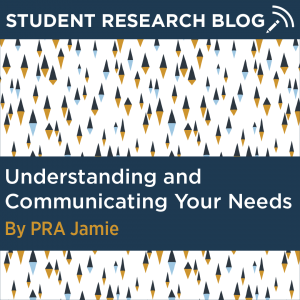By Jamie Georgelos, OUR Peer Research Ambassador
 When joining an established professional environment, it can be difficult to understand how to fit in while also receiving the resources and support you need to succeed. It is even more difficult as an undergraduate in an environment full of grad students who have very different needs and priorities from your own.
When joining an established professional environment, it can be difficult to understand how to fit in while also receiving the resources and support you need to succeed. It is even more difficult as an undergraduate in an environment full of grad students who have very different needs and priorities from your own.
How can you simultaneously learn how to exist within this already established environment, learn your own work style, and ask for these resources in an environment where you are so far down in the hierarchy? Here’s what worked for me.
Learning Your Style
The first step is to learn what your needs are. If you aren’t sure what you need to succeed, take some time to observe and learn dynamics of the work environment and the work style of your supervisors and mentors. In addition, you may have multiple people you’re working with – lab mates, grad students supervising your day-to-day work, and a faculty mentor – all with their own work styles. The initial weeks in a new work environment can be confusing and overwhelming, especially if this is your first experience. If, after a few weeks, you still feel lost, disorganized, or confused, this is a great time to talk with your supervisor or faculty mentor.
Through my research, I learned that I am a person who does best with clearly written instructions, but I didn’t figure this out about myself until a few weeks into my lab experience. My grad student supervisor preferred verbal directions, but I constantly found myself forgetting details, formulas, or important numbers, and I would mess up my experiments. Additionally, I am a person who schedules her entire working life, so I like to have concrete plans. In a lab environment where plans change based on experimental results, resources, and mistakes that inevitably come up, I was having a difficult time planning my school work and lab work. It wasn’t until I recognized my needs and how they differed from my supervisor’s style that things started to change.
Asking for What You Need
The next step is to talk to your supervisor about what your needs are. Obviously, supervisors and mentors want to see you succeed, but it is up to you to communicate your needs with them. In many cases, however, it’s not as simple as identifying your needs and having your supervisor meet them. In my case, it was a combination of having a differing working style from my supervisor, and the constraints of the environment I worked in.
The best way to handle this is to learn the needs of your supervisor as well as their communication style. In a conversation with them, you can be honest about what you need to succeed in a working environment, then come to compromises to make sure both parties are satisfied.
In my relationship, this meant setting up semi-weekly meetings with my grad student supervisor, to which I would bring a printed version of my online calendar, and we could plan experiments in two-week segments. This allowed me to import the information and timepoints into my online calendar, but we could have the conversation in-person and on paper. It also left enough wiggle room for any errors in experiments or lack of resources in the lab. By understanding how my supervisor liked to communicate and plan, I was able to adapt my needs to meet his while still receiving the resources and guidance I needed to succeed.
Continuous Improvement
As you continue to work in professional environments, you will be able to understand your working style and continue to build your working relationships with your supervisors and mentors. I continue to learn more about my needs and preferences, and how to effectively communicate those to my supervisors.
Becoming involved in undergraduate research has been an incredible opportunity not only to further my research interests, but also to refine my work style and better understand how to navigate professional working environments. In scenarios where something may be confusing or not meeting your needs, there will always be a supervisor or mentor, whether in the lab, in the office, or in another avenue of your life, that can help you navigate the conversations toward receiving what you need to be successful.
Jamie is a senior majoring in Molecular and Cell Biology. Click here to learn more about Jamie.